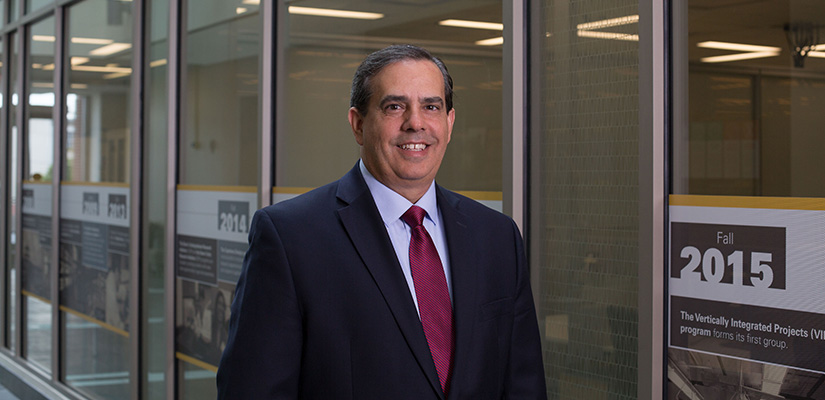Richmond, VA (February 27, 2017) – Earlier this month, students in J.R. Tucker High School’s International Baccalaureate program explored chemistry with Eliseu O. De Oliveira, Ph.D., assistant professor in VCU’s Department of Chemical and Life Science Engineering.
De Oliveira, a researcher in VCU’s Medicines for All Laboratory, welcomed the opportunity to speak at the high school in part because of what he sees as chemistry’s image problem.
“Too many people avoid chemistry because it’s challenging,” he said. “And then there are the ‘toxic’ connotations. You hear things like, ‘Don’t drink that — it has chemicals in it!’ It’s a discipline that needs better marketing.”
He provided just that with information about lifesaving advances in pharmaceutical engineering at VCU. His industry career in his native Brazil — which included designing safer explosives for the mining industry and developing cloud-seeding devices to save endangered crops — also gave students a more complete picture of opportunities in chemical engineering.
“His enthusiasm and passion for the field really showed that chemistry can be fun, regardless of its difficulty,” said Tucker senior Pumoli Malapati, who plans to major in biology, minor in chemistry and ultimately become a cardiologist. “He also showed that chemistry opens up many doors. By choosing to major in chemistry, people have the opportunity to become many different things like chemists, chemical engineers, or pharmacists.”
Tucker senior Mehtab Khara, who also plans to pursue a science major in college, agreed that the presentation “showed just how fun [chemistry] can be” and pointed to one of De Oliveira’s experiments converting agricultural waste into methane to use for fuel as an interesting illustration of “the practicality of chemistry in the real world.”
Rohit Karnati, a Tucker senior who describes himself as a “chemistry enthusiast” was also intrigued by agricultural applications. “One interesting project he discussed had to do with using rockets to stop hail from harming the produce for farmers. I was mesmerized and wanted to follow his story,” Karnati said.
De Oliveira’s philosophy of scientific inquiry and education is a good fit for Tucker’s program. Developed in Geneva, Switzerland, the IB curriculum is academically rigorous and seeks to prepare students for a globalizing world. Its model investigates chemistry and other experimental sciences with an emphasis on application — exactly the right approach, according to De Oliveira.
“Too often in chemistry, there’s a very narrow focus right at the beginning,” he said. “It’s much better to show how to make things and explain why they work.” De Oliveira said that even something as simple as making soap demonstrates properties of a molecule whose long carbon chain attracts lipids and repels water: one end pulls away the grime while the other sends it into the water to be rinsed off.
When De Oliveira was the age of the Tucker students, he was just discovering how chemistry is woven through daily life. That was the idea that made him “fall in love” with chemistry, and what he hoped to convey to the students.
“My goal in a talk like this is to reach the students and get them excited. And who knows? Maybe I’ll be lucky enough to get some future VCU chemical engineering students out of it.”
